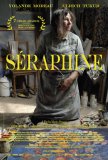Séraphine (France, 2008)
July 18, 2009
When it comes to period piece dramas, whether or not based on true-life characters and events, few countries accomplish these productions better than France. Séraphine, which chronicles slices from the life of 20th century painter Séraphine de Senlis (née Séraphine Louis), is French period piece biography at its best. The characterization is deft, the acting is superb, and the production values are high. If there's a dryness to the way the story is told, that's because director Martin Provost has shifted his focus toward intellectual, not emotional, satisfaction.
The film is not just about Séraphine (Yolande Moreau). It's also the story of German art critic/collector Wilhelm Uhde (Ulrich Tukur), whom history credits as Séraphine's discoverer and patron. Séraphine opens in 1914 rural France (the town of Senlis), where Uhde has settled after abruptly quitting his country of birth. Séraphine is his housekeeper; she spends her days doing various odd jobs like mopping floors and cleaning laundry. By night, however, her "guardian angel" guides her hand as she paints with an almost religious fervor. One day, Uhde glimpses a sample of her work and is duly impressed, but history intervenes before he can begin to fund her painting. The Germans invade France and, because he would be viewed as a deserter by his former country, he must flee before they occupy Senlis. It is more than a decade before he returns to France. His initial assumption is that Séraphine has died in the interim but, when he discovers this is not the case, he re-connects with her and offers to exhibit her work in Paris.
It is a universal truth that a fine line often separates artistic genius from madness. Over the years, many movies have attempted to provide insight into the ecstasy and compulsion associated with this mindset, but few have succeeded (Amadeus and Vincent come to mind as examples of when it has been accomplished). It's not an easy thing to show amorphous concepts like artistic inspiration - they must be suggested rather than rigorously depicted. A movie like La Belle Noiseuse can effectively illustrate the effort that goes into making art, but it is less successful when it comes to demonstrating genius. Séraphine, by focusing on the character as she goes about the mundane activities of her daily life and showing how the ecstasy of painting transformers her at night, captures that elusive quality.
The accomplishment of the film can in no small part be attributed to Yolande Moreau's performance, which is as good as any I have seen thus far this year, and is the equal of Marion Cotillard's interpretation of Edith Piaf in La Vie en Rose. With Moreau, it's all about body language and expression. She's a plain woman - the kind who fits the role of an unprepossessing maid who spends her days doing manual labor - but there's a form of beauty that transformers her features at times, such as when she is seen peering over one of her completed paintings. Her co-star, Ulrich Tukur, is solid, but he lacks the same level of screen presence. In fact, one could make the case that Uhde's story, which is accorded equal time to Séraphine's, is more interesting, but Moreau's portrayal keeps us riveted when she is in front of the camera, whether she's toiling scrubbing a floor, covertly siphoning wax from a votive candle to use as an ingredient for her paint, or communing with nature.
Séraphine doesn't try to be more than it is. Provost is careful to limit his scope. The movie runs 126 minutes but provides windows into only two periods of the title character's life - those when she interacts with Uhde. This is not an epic biopic - it's small and intimate. There is no traditional love story and there are no expensive wartime pyrotechnics (although the period detail is impeccable). In France, the film was the most honored of 2008, winning seven Césars and being nominated for another two, including a Best Actress citation for Moreau. It has also been recognized at many of the international film festivals where it has been screened. Séraphine will not play well to the Transformers crowd - it is slow and deliberate, allowing the characters and settings to breathe. It tells a story that doesn't rely on flashy effects and quick editing. Those who are patient with the movie will find it to be a rewarding experience - one that not only captures something about the interrelationship between art and madness but focuses on character. Too few movies in the late 2000s can make a similar claim.
Séraphine (France, 2008)
Cast: Yolande Moreau, Ulrich Tukur
Screenplay: Marc Abdelnour, Martin Provost
Cinematography: Laurent Brunet
Music: Michael Galasso
U.S. Distributor: Music Box Films
U.S. Release Date: 2009-06-05
MPAA Rating: "NR" (Mature Themes)
Genre: DRAMA
Subtitles: English subtitled French
Theatrical Aspect Ratio: 1.85:1
- (There are no more better movies of Yolande Moreau)
- Last Mistress, The (2008)
- (There are no more worst movies of Yolande Moreau)
- White Ribbon, The (2010)
- (There are no more better movies of Ulrich Tukur)
- (There are no more worst movies of Ulrich Tukur)
Comments